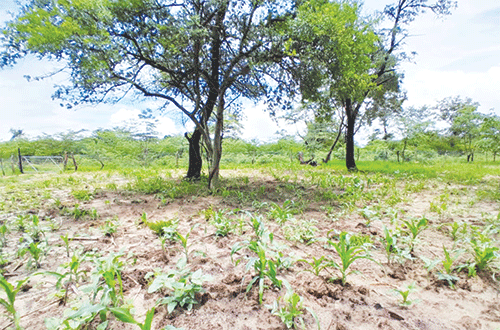KATIMA MULILO - Communal farmers in Zambezi fear a severe drought and loss of their crops after the region recorded a deficit in rainfall in the crucial phase of January to date.
Despite good rains received in most parts of Zambezi since December last year, the rainfall dropped in the first week of January, leaving many crops to dry up while some could not germinate at all.
Such an uncertain situation has left many communal farmers worried if they will get any harvest this year.
One such affected farmer is Albert Chunga who is a resident of Luhonono in Kabbe North constituency. “We are not expecting any bumper harvest this year. Our crops have dried up while they were still in the early stages of germination. Since early January, we did not get any rainfall in our areas,” Chunga complained. To rub salt into wound, the affected farmers also do not have enough grazing pasture for their livestock as no grass germinated.
The water streams also dried up where animals usually drink.
“The grazing land for our livestock is also drying up. We travel long distances in search of water for our livestock. The streams have dried up,” a worried Chunga indicated.
Kabbe North councillor, Bernard Sisamu described the situation as worrisome. “If it takes more than two weeks without rain, crops will dry up. Some crops that were a good height got dried up. The community members are starving. They are without water. Some boreholes have dried up too. There is a need for water supply in the most areas across the region,” he observed.
Sisamu reported the constituency lost quite many livestock due to drought which is a continuation of last year’s dry spell. He said last year, they submitted a regional report detailing challenges facing communal farmers due to a poor harvest. “We reported that there is drought in the region. So far, affected residents received drought relief food from the government. They got maize meal, beans and soup in December and February. Maybe they will get again another consignment. We must inform the government again that people are starving due to poor rainfall
Another affected communal farmer is Barowa Mahachana who resides at Makanga village in the Linyanti constituency. “We got early rain during December, and then it stopped in January. The maize is now dying. We are hopeful that it will rain. Otherwise, we face hunger this year,” Mahachana stressed.
Equally, Morris Simwanza of Malangalanga in Linyanti said although farmers are ploughing, the rain has stopped.
“If the rain come again, people will have a good harvest. So far, we observe that when you look up, there are clouds and rain will come. We will get a good harvest if it rains,” he said.
Sadly, Simwanza said their crop fields were invaded by worms that destroyed their plantations on a larger scale. “The worms destroyed about three hectares of my maize field. They eat when the maize is busy germinating with about five leaves. We are busy replanting. We planted maize on the larger scale because we sell it. We also planted sorghum, mahangu, pumpkins and beans on a smaller scale,” Simwanza noted.
However, government came to their rescue and provided affected farmers with pesticides to treat their fields.
Many farmers remain challenged when it comes to prices charged by private tractors in the area.
The private tractors are charging N$1 200 per hectare to plough and many farmers especially the unemployed and the elderly cannot afford. Hence, many of these rural farmers depend on oxen to plough their fields.
For those without livestock, they wait for their neighbours to lend them their oxen once they are done with their fields. This process takes time as rain is also going. Simwanza said government tractors are very affordable but are not enough to cater for all farmers.
“This year, we saw three government tractors in the area. They are not enough. I managed to plough with a government tractor about five hectares of my field. The government tractor cost N$250 per hectare. It also offers three services including ploughing, disking the land and then plant it. The government tractor cost about N$750 for all three services which is affordable. It’s better to use government tractors if they were sufficient. We are grateful to the government for these services,” he applauded. Linyanti councillor Iven Kubunga confirmed the situation is worrisome for the whole region. He said the rain came December, and it was consistent for about two weeks and then it stopped.
“It’s worrisome. It’s a matter of waiting, but if there is no rain, drought will hit us. Government should be ready to assist the citizens,” Kubunga maintained. Meanwhile, former councillor for Kabbe North and South, Raphael Mbala said some farmers have since desisted growing maize and resorted to planting cassava.
“The rain has done well. However, people are not ploughing maize because the cattle herders leave the livestock unattended. The herd boys leave the livestock to roam around people’s fields. The animals destroy people’s crops when left alone to graze. So, we stopped ploughing and decided to plant cassava since it’s planted on high land,” Mbala said.
-anakale@nepc.com.na


